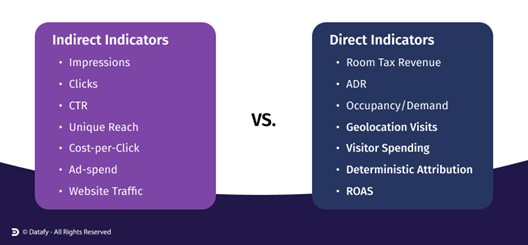
There’s a growing expectation of accountability for DMOs when it comes to reporting metrics. As tourism boards continue to see an increase in economic pressure and budget scrutiny, it’s more important than ever that they can leverage meaningful data and KPIs to prove the real impact of their work.
Accountability in DMO Marketing with the Metrics that Matter
There’s a new and growing expectation of accountability for DMOs when it comes to reporting metrics. As tourism boards continue to see an increase in economic pressure and budget scrutiny, it has become more important than ever that they are able to leverage meaningful data and KPIs to prove the real impact of their work — and reporting on campaign results alone isn’t going to cut it anymore.
Our go-to KPIs of the last decade like CTR, impressions and website traffic are no longer enough to prove that digital marketing efforts are actually working… Which means that it’s time to take a step back to make sure that the metrics we’re monitoring are the ones that really matter.

Indirect Indicators vs. Direct Indicators
At Datafy, we look at accountability and measurement in digital marketing within two different categories of KPIs: indirect indicators and direct indicators.
Indirect indicators like impressions, clicks, CTR, website traffic and cost-per-click have been the standard metrics for reporting on digital advertising campaign effectiveness for years. And while they are important and will continue to have their place in the reporting ecosphere, marketers who rely and report solely on indirect indicators will continue to be asked: …But what does it mean?
This is where direct indicators come in. Direct indicators like room tax revenue, lodging metrics, occupancy, number of trips, visitor spending, return on ad spend (ROAS) and attribution are some of the most meaningful metrics available to DMOs — not only because they measure tangible economic value, but also because they also relate directly to what stakeholders are seeing and looking for in their destination.
While terms like room tax revenue and ADR are generally well-understood in the DMO world, the relatively new digital strategy of attribution isn’t yet — but it really should be. Here’s why: Attribution works by providing concrete matches between those who are exposed to any measured and tracked digital marketing efforts, and those who show up in-market. In doing so, it can give destinations a full-picture measurement of their digital strategies by reporting on the real-life visitation that results from their digital marketing efforts. Attribution can also provide insight into which digital channels and tactics are most effective when it comes to people being exposed to ads and then showing up in market. Plus, it can clearly illustrate which of the digital channels are performing best. (And worst.)
When it comes to looking for accountability in digital marketing, attribution is the gold standard, making it one of the most meaningful of all the different KPIs available to DMOs.

Expert Insights
Recently, we had the opportunity to sit down with Dean Burke, CEO of Tacoma-Pierce County Tourism Authority and Christian Folk, Partner and Digital Director at DVA Advertising and Public Relations. The two tourism leaders delved into accountability and measurement in digital marketing, and the importance of leveraging meaningful data and KPIs to build trust and protect funding.
Burke stressed the importance of listening to your stakeholders’ needs and concerns when considering what data to utilize, rather than telling them what KPIs should matter most. Once you understand their specific, individual priorities, he says, it’s easier to build trust and confidence by providing them with the data and metrics that they need.
“Demonstrating transparent logic and keeping our KPI priorities in order drives confidence that our partners can trust and lean on us,” Burke explained. Doing so has proved fruitful to his organization’s budget: “These committees vote with their money. When things are working and the data is good and the confidence is high, they want more.”
DMO stakeholders are looking to see a clear and defensible stewardship of marketing budgets. Reporting on direct indicators like attribution and return on ad spend can be incredibly effective in doing just this, even if stakeholders aren’t used to these metrics yet: “It can take awhile to understand that we’re not talking about campaign results; we’re talking about economic impact,” Folk laid out. “This is real money that we’re talking about; not spend and impressions.”
Accountability Matters More Than Ever
Adapting to this shift in performance indicators can feel daunting — but let’s not be afraid of it. Leaning into this new demand for accountability within digital marketing is essential to grow confidence and trust in what you’re doing… and, in doing so, is one of the best ways to show your impact and protect your funding.
Interested in learning more about accountability in digital marketing and the metrics that matter? Watch the entire conversation here.
Submit Your Thought Leadership

Share your thought leadership with the Destinations International team! Learn how to submit a case study, blog or other piece of content to DI.


